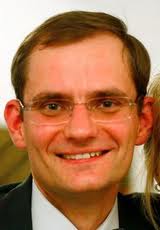The MEFANET 2012 conference will include attractive plenary sessions including invited speakers' lectures.
Plenary session invited speakers |
Luke Woodham
Technical Developer at St George's University of London Luke Woodham is a Technical Developer in the e-Learning Unit at St George's, University of London, working on Virtual Patients in medical education. He has been involved with projects to explore the use of Virtual Patients on mobile devices and in virtual worlds, and to implement these resources in the curriculum. He is also a member of the MedBiquitous Virtual Patient working group, developing technical standards for use in medical education. Using Self-Assessment Virtual Patients on Mobile DevicesHaving used virtual patients (VPs) widely in their medical curriculum, St George's, University of London (SGUL) has developed an application for mobile devices to provide self-assessment VPs that complement group sessions. This presentation will describe the app and explain the educational reasoning underpinning its design, as well as summarising the feedback received. The benefits that it provides for learners will be described, along with a discussion of the practical and technological considerations that have to be addressed when creating such a resource, and the ways that technical standards for educational content are able to assist with this process. |
Adrian Raudaschl
Doctor and researcher of medical education, NHS Greater Glasgow and Clyde, Medmosis, UK Adrian Raudaschl finished his degree in Medicine from Glasgow University in 2011. He is currently working at the Glasgow Royal Infirmary hospital as an FY1. Currently I am researching new applications of medical education through mobile applications. Gamification of Medical EducationApplication of game mechanics to medical education to improve attention, engagement and retention of medical learning material in a mobile application. The aim was to combine the principles of test-enhanced learning i.e. repeated testing of educational material combined with relevant feedback to improve student comprehension and retention, with game mechanics in medical education. Game mechanics such as attractive interfaces, timing, short and long term goals and online competition are utilized by the games industry to promote user engagement and frequent voluntary play.
|
Martin Vejražka
1. LF UK Martin Vejražka is teacher of Medical Biochemistry and Molecular Biology for medical students and students of stomatology. His research activites are focused on reactive oxygen species in cell signaling, oxidative stress in pathogenesis of disease, markers of oxidative stress. Martin is also leader of an international project on electronic support to medical education. Modern teaching approaches in the mirror of Comenius' ideasIn the seventeenth century, John Amos Comenius formulated five principles that teachers should follow in their work: the principle of clarity - the learner should gain a direct experience; principle of consistency - curriculum should well organized, linked and balanced, both within and between subjects; principle of vigorousness - new skills should be obtained by direct experience and should be practically exploited; principle of permanence - repetition of competencies is essential; and the principle of proportionality - training should be adequate to capabilities of students. Comenius also stressed that learning should be amusing and that students should learn each other. |


